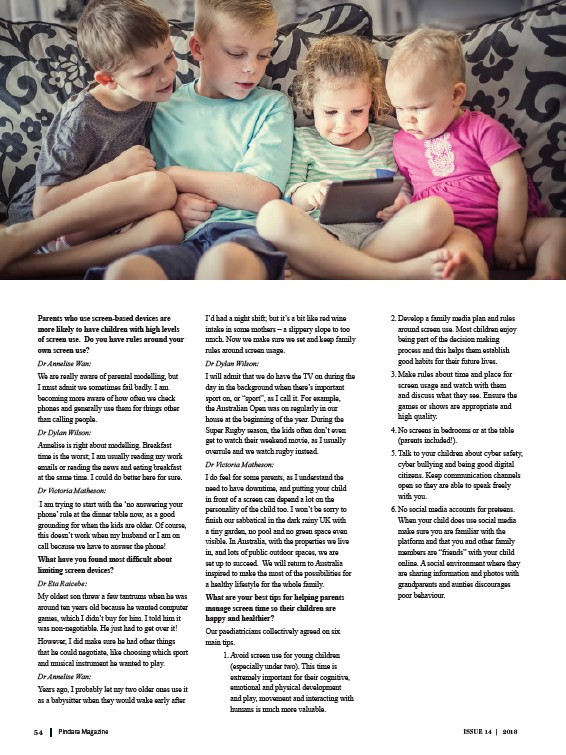
Parents who use screen-based devices are
more likely to have children with high levels
of screen use. Do you have rules around your
own screen use?
Dr Annelise Wan:
We are really aware of parental modelling, but
I must admit we sometimes fail badly. I am
becoming more aware of how often we check
phones and generally use them for things other
than calling people.
Dr Dylan Wilson:
Annelise is right about modelling. Breakfast
time is the worst; I am usually reading my work
emails or reading the news and eating breakfast
at the same time. I could do better here for sure.
Dr Victoria Matheson:
I am trying to start with the ‘no answering your
phone’ rule at the dinner table now, as a good
grounding for when the kids are older. Of course,
this doesn’t work when my husband or I am on
call because we have to answer the phone!
What have you found most difficult about
limiting screen devices?
Dr Eta Raicebe:
My oldest son threw a few tantrums when he was
around ten years old because he wanted computer
games, which I didn’t buy for him. I told him it
was non-negotiable. He just had to get over it!
However, I did make sure he had other things
that he could negotiate, like choosing which sport
and musical instrument he wanted to play.
Dr Annelise Wan:
Years ago, I probably let my two older ones use it
as a babysitter when they would wake early after
I’d had a night shift; but it’s a bit like red wine
intake in some mothers – a slippery slope to too
much. Now we make sure we set and keep family
rules around screen usage.
Dr Dylan Wilson:
I will admit that we do have the TV on during the
day in the background when there’s important
sport on, or “sport”, as I call it. For example,
the Australian Open was on regularly in our
house at the beginning of the year. During the
Super Rugby season, the kids often don’t even
get to watch their weekend movie, as I usually
overrule and we watch rugby instead.
Dr Victoria Matheson:
I do feel for some parents, as I understand the
need to have downtime, and putting your child
in front of a screen can depend a lot on the
personality of the child too. I won’t be sorry to
finish our sabbatical in the dark rainy UK with
a tiny garden, no pool and no green space even
visible. In Australia, with the properties we live
in, and lots of public outdoor spaces, we are
set up to succeed. We will return to Australia
inspired to make the most of the possibilities for
a healthy lifestyle for the whole family.
What are your best tips for helping parents
manage screen time so their children are
happy and healthier?
Our paediatricians collectively agreed on six
main tips.
1. Avoid screen use for young children
(especially under two). This time is
extremely important for their cognitive,
emotional and physical development
and play, movement and interacting with
humans is much more valuable.
2. Develop a family media plan and rules
around screen use. Most children enjoy
being part of the decision making
process and this helps them establish
good habits for their future lives.
3. Make rules about time and place for
screen usage and watch with them
and discuss what they see. Ensure the
games or shows are appropriate and
high quality.
4. No screens in bedrooms or at the table
(parents included!).
5. Talk to your children about cyber safety,
cyber bullying and being good digital
citizens. Keep communication channels
open so they are able to speak freely
with you.
6. No social media accounts for preteens.
When your child does use social media
make sure you are familiar with the
platform and that you and other family
members are “friends” with your child
online. A social environment where they
are sharing information and photos with
grandparents and aunties discourages
poor behaviour.
54 Pindara Magazine ISSUE 14 | 2018